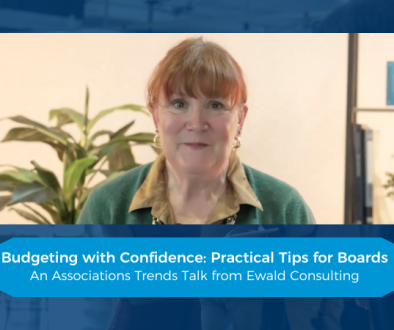10 Tips for Creating a Great Budget
Creating your association’s annual budget is one of the most important components of running a successful association. The budget lays the groundwork for the coming year and sets expectations. A great budget helps to keep an association on track, plan for the future, and assess the organization’s financial well-being.
Here are 10 tips to ensure you create a great budget for your association:
- Start early with a detailed plan. Set a clear timeline with deadlines for everyone involved at each step.
- Carefully review the current year’s financials and come up with a yearend projection for the current year.
- Budget time is a great time to review the financial statements and the line items being used. Ask yourself: Are the financials clear? Do they help the board understand our association? If the answer is no to either of these questions, you may want to consider the structure of your financials. It is important that the financials are clear and easy to understand for board members so that everyone can understand the financial position of the association.
- Don’t just copy and save the prior year’s numbers. Carefully review each income and expense line to analyze what is being planned for the coming year and decide what direction that number is anticipated to go.
- Determine if you want your budget prepared on an annual or monthly basis. If there is a large conference that occurs in June, it might make sense to budget all related revenue and expenses in the month of June. However, it does make sense to spread out monthly expenses, like rent, throughout the year.
- A budget should be a collaborative effort. Include those affected by the budget and get input from committees and staff. This will ensure the budget is set up with the best information available.
- A budget is not a wish. Budget numbers need to be realistic. If you want to use a membership number that is 20% higher than the prior year, then you need a plan to achieve this number. The plan should also include any related expenses of new initiatives. Plugging in overly optimistic numbers to help make your budget look balanced will only put pressure on volunteers and staff and cause failure later.
- Review contracts to ensure that the correct numbers are getting put in for vendor contracts, event expenses, etc. Some vendors may build in annual increases — be diligent in particular with any multi-year contracts.
- Once the budget is approved, budget work is not complete. Monitor and review your budget throughout the year to ensure you are meeting targets — or if you are coming up short in certain areas and need to make changes.
- It’s never too early to plan for the next budget year. As you analyze budget vs actual results during the fiscal year, start a file where you keep notes about things to consider when creating the next year’s budget.




